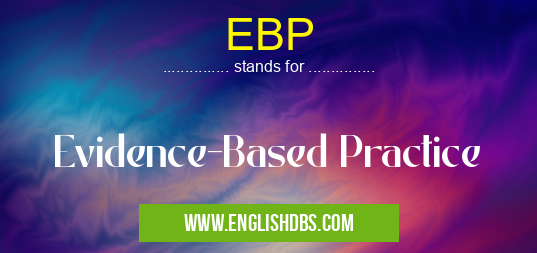What does EBP mean in BRITISH MEDICINE
EBP (Evidence-Based Practice) is a problem-solving approach that integrates the best available research evidence with clinical expertise and patient values to guide clinical decision-making and improve patient outcomes. It involves using scientific evidence to make informed decisions about healthcare interventions and treatments, rather than relying solely on tradition or personal experience. EBP is an essential component of modern healthcare and is widely recognized as the gold standard for clinical practice.

EBP meaning in British Medicine in Medical
EBP mostly used in an acronym British Medicine in Category Medical that means Evidence-Based Practice
Shorthand: EBP,
Full Form: Evidence-Based Practice
For more information of "Evidence-Based Practice", see the section below.
Key Elements of EBP
EBP consists of five key steps:
- ASK: Formulate a clear clinical question based on a patient's health concern or problem.
- ACQUIRE: Search for and critically appraise relevant scientific evidence to answer the question.
- APPRAISE: Evaluate the quality and applicability of the evidence to the patient's situation.
- APPLY: Integrate the evidence with clinical expertise and patient values to make an informed decision about the best course of action.
- ASSESS: Monitor and evaluate the outcomes of the decision to determine its effectiveness and make any necessary adjustments.
Benefits of EBP
Implementing EBP in healthcare offers numerous benefits, including:
- Improved patient outcomes: EBP helps healthcare professionals make informed decisions that are supported by scientific evidence, leading to better patient results.
- Reduced healthcare costs: By using effective and evidence-based interventions, EBP can reduce unnecessary treatments and improve resource allocation.
- Enhanced patient satisfaction: EBP empowers patients to participate in their healthcare decisions and promotes trust between patients and healthcare providers.
- Continuous improvement: EBP fosters a culture of continuous learning and improvement, as healthcare professionals regularly review and update their knowledge and practices based on new evidence.
Essential Questions and Answers on Evidence-Based Practice in "MEDICAL»BRITMEDICAL"
What is Evidence-Based Practice (EBP)?
EBP is a systematic approach to healthcare that relies on the best available scientific evidence to make decisions about patient care. It involves integrating clinical expertise, patient values, and the best available research results to provide the most effective care possible.
Why is EBP important?
EBP ensures that healthcare decisions are based on the most up-to-date and reliable evidence, rather than on tradition or personal preferences. This helps to improve patient outcomes, reduce healthcare costs, and promote transparency in healthcare decision-making.
How is EBP used in healthcare?
EBP is used in all aspects of healthcare, from diagnosis and treatment to prevention and rehabilitation. Healthcare professionals who practice EBP use a variety of methods to gather and interpret evidence, including:
- Systematic reviews
- Meta-analyses
- Randomized controlled trials
- Observational studies
- Case reports
What are the steps involved in EBP?
The steps involved in EBP include:
- Asking a focused clinical question
- Searching for the best available evidence
- Critically appraising the evidence
- Integrating the evidence with clinical expertise and patient values
- Making a decision about the best course of action
- Evaluating the outcomes of the decision
What are the challenges of implementing EBP?
Some of the challenges of implementing EBP include:
- Lack of time and resources
- Lack of access to high-quality evidence
- Difficulty in interpreting and applying research findings
- Barriers to changing clinical practice
How can healthcare professionals overcome the challenges of EBP?
Healthcare professionals can overcome the challenges of EBP by:
- Prioritizing EBP and allocating time and resources to it
- Developing skills in searching for and appraising evidence
- Collaborating with other healthcare professionals to implement EBP
- Advocating for policies and systems that support EBP
Final Words: EBP is a fundamental component of modern healthcare that promotes the use of scientific evidence to guide clinical decision-making and improve patient outcomes. By integrating the best available research with clinical expertise and patient values, EBP empowers healthcare professionals to provide high-quality, evidence-based care that meets the unique needs of each patient.
